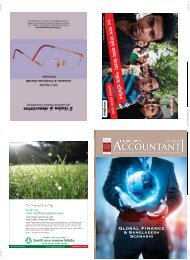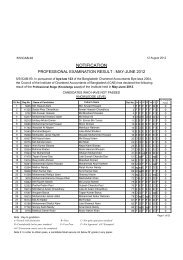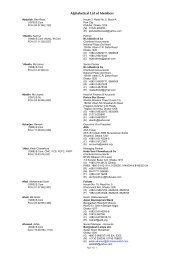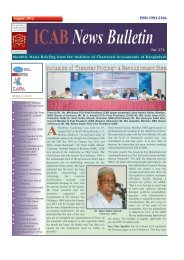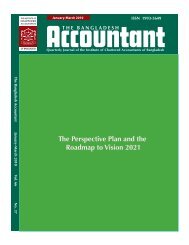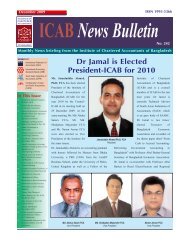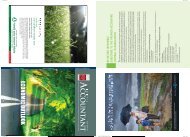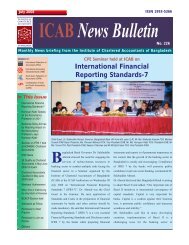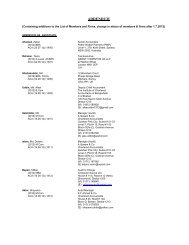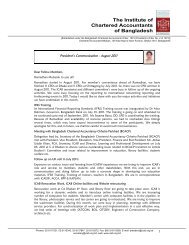Forma # 1.ai - ICAB
Forma # 1.ai - ICAB
Forma # 1.ai - ICAB
Create successful ePaper yourself
Turn your PDF publications into a flip-book with our unique Google optimized e-Paper software.
13. Take breaks: Do not study at a stretch for too<br />
long. Take a short 5 minute break every 1-1.5<br />
hours. During this time, do not watch TV or<br />
use the computer. Rest your eyes, stretch<br />
your legs, walk around a little bit, eat or drink<br />
something. In general, relax. Studying on an<br />
empty stomach will cause a headache.<br />
14. Take mock exams: Practice writing in exam<br />
conditions as much as you can,. Attempt<br />
mock exams at home. This will help you to<br />
estimate the speed and quality of your writing.<br />
15. Preparing for the exam: Start preparing for<br />
the exam 2-3 days before the exam starts. Buy<br />
your stationery and a stationery case. Get<br />
new batteries for your calculator. Photocopy<br />
your admit card and routine. Arrange your<br />
clothes for the exam days (wear something<br />
comfortable but not too old or shabby) and<br />
consult a doctor if you have any illness like<br />
influenza, toothache etc. It is better to start<br />
medication a couple of days before, rather<br />
than on the day of the exam. Don’t learn or<br />
read anything new on the day before the day<br />
of exam. All you should do is to revise what<br />
you have already done.<br />
16. On the Exam day: Rise early, have a good<br />
breakfast, drink plenty of fluids. Do not<br />
become nervous, trying to revise too many<br />
things in the morning. If you are a religious<br />
person, say your prayers. Start from home<br />
early, allowing for traffic jams, bad weather<br />
etc. If you are using public transport, carry<br />
small notes and change with you so that you<br />
will not waste time while trying to pay your<br />
fare with large notes. Make sure you have<br />
got everything you need. Do not attempt an<br />
exam on an empty stomach.<br />
17. During the exam: When you receive the<br />
question paper, spend some time to read it.<br />
First attempt the question you know best. This<br />
will create a good impression in the mind of<br />
the examiner. Write the question number<br />
and reference clearly. Always begin the<br />
answer to a question with one or two<br />
summary sentences. Begin a new paragraph<br />
for each point or idea. Attempt all questions.<br />
Underline key points. Write legibly. Do not<br />
write too small.<br />
18. Save some time for revision and tidying up:<br />
Keep at least 10 minutes for revision. Keep<br />
another 5 minutes for tidying up<br />
your script (signature,<br />
numbering, stapling<br />
additional scripts etc.). Do<br />
not speak to others during the<br />
examination.<br />
19. Be professional in your<br />
presentation: Presentation is<br />
the method of communicating<br />
your knowledge to the<br />
examiner in the most<br />
appropriate manner.<br />
Communicating your<br />
knowledge means that what<br />
you mean and know is exactly<br />
conveyed to the examiner.<br />
There should not be any<br />
ambiguity in the answers.<br />
This is a professional exam, so<br />
your approach and<br />
presentation should match the<br />
requirements of the question.<br />
If you are required to write a<br />
letter or report, make sure it is<br />
good enough to be presented<br />
to a Partner at your office. If<br />
you are preparing a set of<br />
financial statements, make<br />
sure it is in the correct format<br />
and sequence as per the<br />
accounting and reporting<br />
standards.<br />
20. After the exam: Do not<br />
distress yourself discussing<br />
your mistakes with anyone.<br />
What has happened has<br />
happened; it cannot be<br />
changed. Discussion will only<br />
spoil your other papers. Once<br />
all your exams are over, you<br />
should make a note of all the<br />
mistakes and drawbacks for<br />
future reference. Look them<br />
up before the next exams.<br />
Wish you all the best!!<br />
While everyone has their own particular<br />
effective method of studying, a few things<br />
work for all.<br />
The Bangladesh Accountant January - March 2011 71




